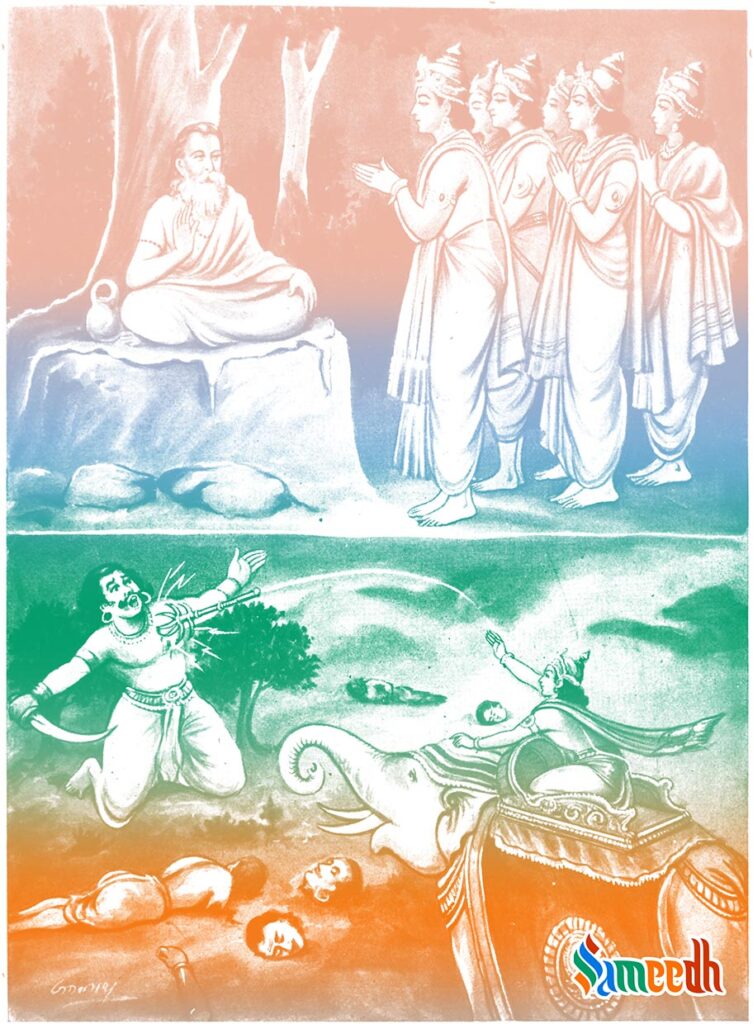Rishi Dadhichi is one of the most revered Rishis of the ancient Bharat. He is best known for sacrificing his life for the Devtas, so that the Vajra (weapon) could be made out of his bones to kill the demon named Vritrasur.

King of Deities Indra pray to Dadhichi to give his spinal cord to make a thunderbolt; Image Source: Ramanarayanadatta Astri
Rishi Dadhichi is one of the most revered Rishis of the ancient Bharat. He is best known for sacrificing his life for the Devtas, so that the Vajra (weapon) could be made out of his bones to kill the demon named Vritrasur, who had captured the Indralok and he was granted a boon that no existing weapon during that time would be able to kill him.
Early life and history of Rishi Dadhichi
According to the Bhagwat Puran, Rishi Dadhichi was born to parents named Rishi Atharvan and Mata Chiti. Since childhood, Rishi Dadhichi was an ardent devotee of Mahadev. He had roamed around many parts of India along with his wife Swarcha and son Pippalad, where he had established his ashrams. He is believed to have meditated on the banks of a river near Dahod (Gujarat) hence; the river is named as ‘Dudhimati’ as an honour to the great Rishi Dadhichi. Later, he travelled to Ahmedabad, where he is believed to have stayed for a while and established an ashram. He then journeyed to the state of Uttar Pradesh, where he lived in his ashram at Naimisharanya near Lucknow. The ‘Narayan Kavacham’ a well-known hymn sung for courage and calm in southern India, is written by Rishi Dadhichi. He has also written prayers and mantra chants for Hinglaj Mata. His descendants are said to be the Dadhich Brahmins, who are mostly found in Rajasthan and later spread to the other parts of the world.
Why is Rishi Dadhichi also known as ‘Ashwashira’?
According to legend, Dadhichi was a practitioner of Brahmavidya, also called Madhu vidya. It is said that Madhu vidya could help mortal beings become immortal. Given the magnitude of the authority in Rishi Dadhichi’s hands, Indra, the King of the Devtas, feared his position was vulnerable. As a result, Indra vowed to behead Rishi Dadhichi and also opposed the Ashwini brothers mastering Brahmavidya. The Ashwini brothers, on the other hand, aspired to master this art and came up with a strategy to keep Dadhichi safe from Indra. Using the same vidya that Rishi Dadhichi taught them, they chopped off Rishi Dadhichi’s head, preserved it, and replaced it with a head from a horse. The horse-headed sage was beheaded by Indra in his rage before he fled. The Ashwini brothers used the Madhu vidya to revive Rishi Dadhichi by placing his severed head back on his body. As a result, the sage earned the title ‘Ashwashira’, which means ‘the one with a horse’s head’.
Rishi Dadhichi’s great sacrifice for mankind
According to a story, an asur by the name of Vritrasur once tried to snatch the Devlok from the king of Gods, Indra dev. Since Vritrasur was granted a boon that prevented him from being killed by any weapon made of wood or other metals. Indra dev went to request Bhagwan Vishnu for help together with Bhagwan Shiv and Brahma dev. It is then, that Bhagwan Vishnu told Indra dev that, only a weapon crafted from the bones of Rishi Dadhichi will be able to destroy Vritrasur.
Therefore, Indra dev alongwith other Devtas went to Rishi Dadhichi and pleaded with him to help in defeating Vritrasur. In response to his request, Rishi Dadhichi said that he wanted to visit every holy river before he sacrifices his body. Rishi Dadhichi’s wish was indeed granted by Indra dev, who then gathered the waters of all the sacred rivers to Naimisharanya, Rishi Dadhichi’s ashram. After taking a bath in the Holy water, Rishi Dadhichi gave up his life. The Devtas then utilized Rishi Dadhichi’s spine to create the Vajra (weapon), which was subsequently used to kill the asur and reinstate Indra dev to his rightful position as the King of Devlok.
Rishi Dadhichi’s reverence passes across generations
Rishi Dadhichi earned the admiration from everyone for his sacrifice by enabling the Devtas to kill Vritrasur. Rishi Dadhichi is the torch bearer of the idea that no sacrifice is too great to contribute in protecting the helpless from evil. Indian Army’s highest Gallantry award ‘Param Vir Chakra’, was inspired by this concept and is most frequently conferred to the soldiers who exhibit outstanding bravery in the battlefield.